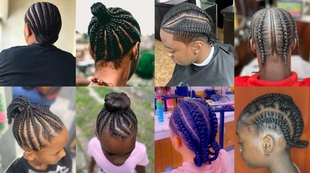
support@yorubalibrary.com
+2348073529208, 07038599574

Yoruba traditional hairstyles are not just about aesthetics; they hold deep cultural significance and reflect the identity, status, and beliefs of the Yoruba people of Nigeria. These intricate styles are a testament to the creativity and artistry embedded in Yoruba culture.
Historical Background of Yoruba Hairstyles
Yoruba hairstyles date back centuries and have evolved with the times while retaining their cultural essence. Historically, these hairstyles were crafted to signify various stages of life, social status, and even spiritual beliefs. Each hairstyle tells a story, connecting the wearer to their ancestry and community.
Popular Yoruba Traditional Hairstyles
Sùkú
Sùkú is one of the most iconic Yoruba hairstyles, characterized by its intricate braided patterns.
• Meaning: The Sùkú hairstyle, where the braids are styled to form a raised, basket-like shape on top of the head, symbolizes sophistication and elegance. It is often worn by young women and brides.
• Occasions: Sùkú is typically worn during festivals, weddings, and other significant ceremonies.
Ìpàkó-Elédè
Ìpàkó-Elédè translates to "pork head" and is a style where the hair is braided backwards from the front, creating a sleek look.
• Meaning: This hairstyle signifies youth and vitality. It is commonly worn by young girls and unmarried women.
• Occasions: It is a popular choice for everyday wear, as well as during traditional events.
Kojusoko
Kojusoko is a braided style where the braids are styled to fall towards the forehead.
• Meaning: This style represents boldness and a forward-looking attitude. It is associated with modernity and adaptability.
• Occasions: Kojusoko is often seen at contemporary social gatherings and celebrations.
Shuku
Shuku involves braiding the hair to form a raised ridge running from the forehead to the nape of the neck.
• Meaning: Shuku is a regal hairstyle that signifies respect and maturity. It is often worn by older women and those in positions of authority.
• Occasions: This style is favored for important community gatherings and traditional ceremonies.
Symbolism and Cultural Significance
Yoruba traditional hairstyles are laden with symbolism, reflecting various aspects of life and society:
• Identity and Heritage: Hairstyles are a visual representation of one’s cultural heritage and identity. They connect individuals to their roots and ancestors.
• Social Status: Certain hairstyles are reserved for specific social classes or age groups, indicating the wearer’s status within the community.
• Ritual and Ceremony: Many hairstyles are crafted for specific rituals and ceremonies, such as weddings, festivals, and rites of passage, adding to their cultural importance.
• Spiritual Beliefs: Some hairstyles are believed to offer protection or blessings, incorporating spiritual beliefs into everyday life.
Modern Adaptations
While traditional hairstyles remain popular, modern adaptations have emerged, blending old and new elements:
• Fusion Styles: Contemporary Yoruba women often combine traditional braiding techniques with modern styles, creating unique and fashionable looks.
• Cultural Renaissance: There is a growing trend of embracing traditional hairstyles in their purest forms, especially among younger generations seeking to reconnect with their heritage.
• Global Influence: Yoruba hairstyles have gained international recognition, influencing global fashion trends and hairstyles.
Conclusion
Yoruba traditional hairstyles are more than just hairdos; they are a vital part of the Yoruba cultural fabric, reflecting history, identity, and social values. From the elegant Sùkú to the bold Kojusoko, each style tells a story and carries a deeper meaning, preserving the rich cultural heritage of the Yoruba people.

Learn about the Yoruba concept of Ìwà Pẹ̀lẹ́ (good…

Learn special praises for Divine Being and Creator…